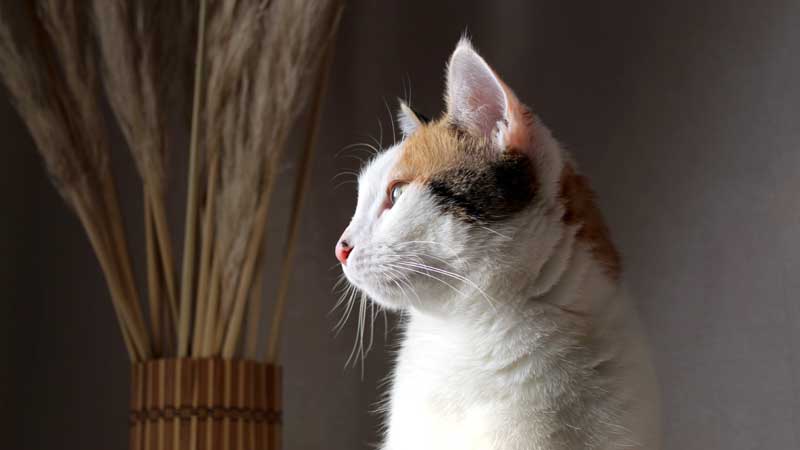What Are Covid Symptoms In Cats?

If you or someone visiting you has caught Covid, then there is a chance it could be passed on to your feline friend. Humans have been found to spread the virus to cats, however, there is no evidence that cats can spread Covid to humans.
If your cat goes outside, there is also a chance they will catch the virus from other cats. Them being exposed is no cause for panic, since the majority of cases in cats are mild or asymptomatic, but it is important you know Covid symptoms in cats and can take measures to care for them.
Cats infected with COVID-19 develop similar symptoms to humans. Like a common cold or respiratory illness, Covid symptoms in cats include:
1. Coughing or sneezing
If your cat coughs or sneezes occasionally, then that is nothing out of the ordinary. However, if you notice them doing it more than usual, it could be a sign of infection. It is important in allowing your kitty to clear out mucus and get the virus out of its system.
2. Difficulty breathing or wheezing
You can tell your cat has difficulty breathing if they are breathing rapidly or taking long, drawn-out breaths. There could also be a wheezing, rattling, or whistling noise as they inhale or exhale. Keep a close eye on them in case the symptoms worsen.
3. Fever (over 102.5 Farenheight in cats)
Getting a fever is a usual part of fighting an infection, and you can get an accurate reading by using a digital ear thermometer in your cat's ear. Make sure to give your cat plenty of water so they stay hydrated while fighting off the fever.
4. Lethargic
Signs of lethargy include playing less, hiding away, grooming less, and sleeping more than usual. You know your cat and can compare their current behavior against their usual energy levels. Let them rest and find a comfortable, quiet spot for them.
5. Runny nose
Your cat may have discharge coming from its nose as a way to expel the virus. You can help ease this by cleaning their nose with a damp cloth or cotton ball soaked in warm water, helping to keep their nasal passage clean.
6. "Sleep" in their eyes
After a long cat nap, it is common for cats to have some discharge build-up in their eyes. However, if there is more discharge than usual this could be a sign of infection.
7. Diarrhea or vomiting
These symptoms are a pretty obvious sign your cat is unwell, but make sure you don't miss it by carefully checking the contents of your cat's litterbox. Keep your cat well-hydrated, and ask your vet about treatments to ease these symptoms, if necessary.
While Covid symptoms in cats are fairly mild, you should still take measures to help prevent your cat from catching it. If you contract the virus, limit your contact with your pet and ensure you wash your hands before and after every interaction. If possible, leave the cat care to someone in the household who is virus-free.
Please reach out for advice from your vet if you are concerned about your cat's health and general wellbeing.
References
- [1] ^ CDC: What You Should Know about COVID-19 and Pets
- [2] ^ Veterinary Medicine: Frequently Asked Questions COVID-19 and Feline Health
You May Also Like
 Dog HealthWhat Does Vitamin B1 Do For Cats?
Dog HealthWhat Does Vitamin B1 Do For Cats? Cat HealthHow Much Thiamine Does A Cat Need Per Day?
Cat HealthHow Much Thiamine Does A Cat Need Per Day? Cat HealthThe Cat's Nose Is Dry, Is It Sick?
Cat HealthThe Cat's Nose Is Dry, Is It Sick? Cat HealthWhat Are The Symptoms Of Gastritis In Cats?
Cat HealthWhat Are The Symptoms Of Gastritis In Cats? Cat HealthHow Long Do Cats With Feline Idiopathic Cystitis Live?
Cat HealthHow Long Do Cats With Feline Idiopathic Cystitis Live? Cat HealthDo Cats Carry The Feline Coronavirus For Life?
Cat HealthDo Cats Carry The Feline Coronavirus For Life?